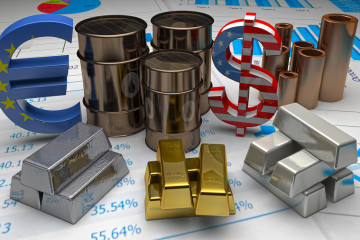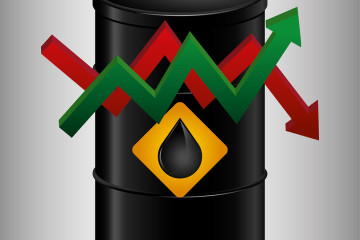Euro Climbs Along With Oil as Japan Stocks Decline: Markets Wrap

(Bloomberg) —The euro spiked higher as the dollar weakened for a second day and oil rebounded in thin end-of-year trading. Japanese and Australian stocks fell.
European currencies including the Danish krone and Swiss franc also appreciated against the greenback and the Bloomberg Dollar Spot Index shifted lower after reaching the highest level in more than a decade earlier this week. The S&P 500 Index benchmark ended little changed on Thursday in New York following the announcement of new American sanctions against Russia over election hacks. European stocks fell and crude oil in New York slipped for the first time since Dec. 15.
Trading has been thin across the globe during the last week of the year, with volumes in crude oil, equities and currencies all below average. Investors may be reallocating money as they assess asset moves in the wake of the U.S. election that took the dollar to multi-year highs, sent Treasuries tumbling and spurred a rally in American equities.
“Markets are extremely thin and perhaps position tuning occurred,” according to Shigeki Yoshitoshi, head of Japan foreign-exchange and commodities sales at Australia & New Zealand Bank Group Ltd. in Tokyo. There was no “particular news” driving the euro higher.
Currencies
The euro rallied as much as 1.6 percent before paring its advance to 0.7 percent and trading at $1.0558 as of 9:15 a.m. in Tokyo. The Danish, Norwegian and Swiss currencies all climbed at least 0.5 percent. The yen added 0.2 percent to 116.32 per dollar. The Bloomberg Dollar Spot Index slipped 0.4 percent after dropping 0.5 percent Thursday, although it remains up 2.7 percent for the year.Stocks
Japan’s Topix fell 0.6 percent and is set for a 2.4 percent decline in 2016. The Nikkei 225 index was down 0.7 percent on Friday. Australia’s S&P/ASX 200 Index dropped 0.5 percent, while New Zealand’s S&P/NZX 50 was off by 0.2 percent. FTSE China A50 futures gained 0.3 percent, as did futures for Korea’s Kospi gauge. Hang Seng Index futures slid 0.1 percent in most recent trading. The S&P 500 fell less than one point to 2,249.26 on Thursday in New York, the lowest close since Dec. 8. The Dow Jones Industrial Average slipped to 19,819.78, maintaining a 14 percent advance this year. The Stoxx Europe 600 Index lost 0.4 percent, after closing at the highest level in a year on Wednesday. The gauge is down 1.5 percent for 2016.
Commodities
Crude futures rebounded 0.3 percent to $53.95 a barrel, clawing back some of Thursday’s 0.5 percent decline. Gold rose for a fifth session Friday, adding 0.2 percent to $1,160.32 an ounce. The metal has been rebounding from an 11-month low.
Bonds
The yield on 10-year Treasury notes was little changed Friday at 2.47 percent after dropping three basis points Thursday. It slid as low as 2.46 percent earlier in the week, the lowest since Dec. 14. The equivalent Australian yield was one basis point higher at 2.79 percent, while the yield on similar tenor New Zealand notes dropped five basis points to 3.33 percent. U.K. gilts led European bonds higher Thursday, with the 10-year yields six basis points lower at 1.24 percent. The yield on German 10-year bunds fell two basis points to 0.18 percent.
–With assistance from Chikako Mogi. To contact the reporters on this story: Benjamin Purvis in Sydney at bpurvis@bloomberg.net ;Daisuke Sakai in Tokyo at dsakai2@bloomberg.net To contact the editors responsible for this story: Benjamin Purvis at bpurvis@bloomberg.net Andreea Papuc






No Comment